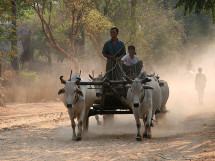Burma at the Crossroads Maintaining the Momentum for Reform
The people of Burma are at a critical juncture in their struggle for democracy and ethnic reform. Decisions taken by leading parties and protagonists in the months ahead could well define the direction of national politics for many years to come.

If you have trouble viewing this publication in PDF, please kindly use an alternative PDF viewer.
The people of Burma are at a critical juncture in their struggle for democracy and ethnic reform. Decisions taken by leading parties and protagonists in the months ahead could well define the direction of national politics for many years to come. After decades of conflict and military-dominated government, an epoch- shaping time has arrived.
Following the 1 April by-elections, the inclusion of the National League for Democracy (NLD) in the new parliamentary system of government could indicate that progressive reforms can be introduced under the 2008 constitution. Similarly, political discussions, as part of government ceasefires with armed ethnic opposition groups, could promote confidence that a sustainable process can emerge towards achieving national peace and reconcilia- tion.
Political transition, however, is at a very early stage. Since the 2011 accession to power by the government of President Thein Sein, a new energy and openness have occurred in many aspects of national life. This reform potential has been wel- comed by Western governments and international institutions that have begun to lift or suspend different sanctions.
--
Conclusions and Recommendations
- After decades of division in national politics, the recent steps towards reconciliation and democratic reform by the Thein Sein government are welcome. The participation of the National League for Democracy in the April by-elections, new ceasefires with armed ethnic opposition groups and prioritization of economic reforms are all initiatives that can contrib- ute to the establishment of peace and democracy.
- The momentum for reform must now continue. Remaining political prisoners must be released; a sustainable ceasefire achieved with the Kachin Independence Organisation and other armed opposition groups; and the provision of humanitarian aid to internally displaced persons and other vulnerable peoples needs to be accelerated.
- The 2015 general election is likely to mark the next major milestone in national politics. In the meantime, it is vital that processes are established by which political reform and ethnic peace can be inclusively developed. Burma is at the beginning of change – not at the end.
- The international community should support policies that encourage reconcilia- tion and reform, and which do not cause new divisions. Burma’s needs are many, but local and national organisations are ready to respond. Aid priority should be given to health, education, poverty alleviation, displaced persons and other humanitarian concerns.
photo by jmhullot
Pages: 16